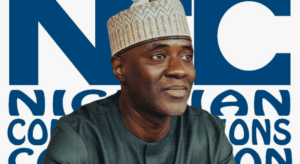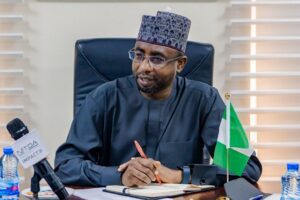Space engineers call for spy satellites to address security challenges
The Nigerian Institution of Space Engineers (NISEng) on Tuesday inaugurated its sixth National Chairman, Dr George Okpanachi, and called for a specialised reconnaissance satellite to address national security.
The inauguration held concurrently with a One-day Public Lecture with the theme: “Space Technology and National Security: Opportunities and Limitations” in Abuja.
Prof. Lazarus Ojigi, Director, Mission Planning IT and Data Management of the National Space Research and Development Agency (NASRDA), was the guest lecturer.
He said that space technology had become the driving force behind scientific, socio-economic, military and intelligence supremacy of developed nations of the world.
Ojigi said that national security was all about national safety with food security, economic, social, physical, energy, environmental, border, cyber securities as components.
A reconnaissance satellite or intelligence satellite (spy satellite) is an Earth observation satellite or communications satellite deployed for military or intelligence applications.
“We must deploy specialised satellite, reconnaissance satellite that will assist the armed forces in detecting danger locations.
“We need to invest in satellite infrastructure, ground segment infrastructure; you must not have satellite just to harvest information from satellites in the orbit.
“Having the ground segment will help us to subscribe and optimise; you will have enough information for your security agencies and those information are encrypted for them to use.
“We also need to develop our Inertia Navigation System (INS) and Guidance; that means that we must be able to detect where criminals are using global navigation techniques added to INS techniques,” Ojigi said.
He added that the country needed to invest in infrastructure across Nigeria, train manpower and build a level of confidence with confidential security information.
He said that there was need to increase the number of communication satellites to improve surveillance.
“Now we have one communication satellite and the proposal is to have three prototype to create an overlap to cover the whole world.
“By that architecture, Nigeria will not only provide satellite signals but services in terms of telecommunications, internet and augmentation services to Africa and other parts of the world.
He further said that if the country could not provide three communication satellites, it could optimise the available one.
According to him, it is better to scale up the satellite asset and get better services.
Okpanachi, in his remarks, said he was going to galvanise relevant stakeholders in the space sector, the National Assembly, and agencies to get the needed support for NASRDA and Nigeria Communications Satellite Limited.
He expressed the hope that NISEng would advance to compete with other engineering bodies in the country in the future.
“We will be paying courtesy visits to relevant agencies and letting them know that we have the capacity to deliver if given the necessary assistance particularly the funding aspect.
“If we are well funded with the capacity and capability, it can help in tackling the security challenges and this includes having more satellites in space, synthetic aperture satellites, going into drones and cube satellites,” he said.
Dr Sadiq Umar, the immediate past chairman of NISEng, encouraged the incumbent and his executive members to push for the institution to participate in the Group Dynamics competition for all Division of the Nigerian Society of Engineers.
He also called on the new helmsmen to as well ensure that the institution stood out.
Umar said that he was grateful that he enjoyed great support from the incumbent chairman as his vice and other past chairmen during his tenure from 2019 to 2020.
He, however, encouraged his colleagues and the space industry stakeholders to extend same support to Okpanachi to ensure the institution helped in developing robust space technology programmes in the country.
Rtd. Major Gen. Michael Agu, the pioneer chairman of NISEng, recalled that the institution had a Memorandum of Understanding with NASRDA on corporation and space activities.
According to Agu, same understanding and working relationship can be extended to the Defence Space Administration (DSA) and other stakeholders to ensure that issues on security are addressed.
Other goodwill messages included from the DSA, National Productivity Centre, NASRDA and other past chairmen of the institution, a who called for more funding for space programmes.
They also called for collaboration among space technology stakeholders to boost development in the sector.




